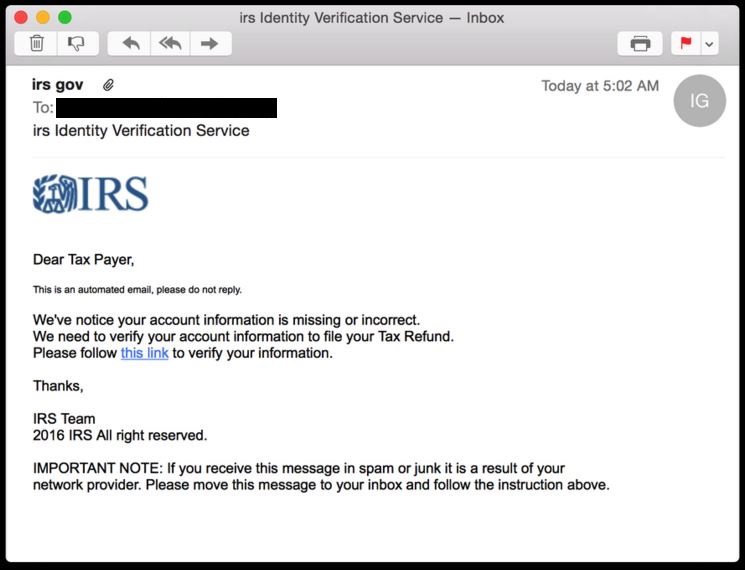IRS Phishing Scams Right on Time for Tax Season
January 14, 2016
It’s no surprise to the U.S. public, nor is it apparently news to the Eastern European hacking community that it’s tax season. That means there will be no shortage of phishing email messages claiming to be from the IRS showing up in our in boxes. In fact, a security researcher from Kaspersky Labs has just warned of one that requests private information be entered into a form claiming to be from the IRS. However, that form is hosted in Eastern Europe, which is not where the IRS hosts forms.
The IRS will not request information from you in an unsolicited email message, phone call, or fax. In fact, on the IRS website, there is an entire page devoted to this topic and it starts with “The IRS doesn't initiate contact with taxpayers by email, text messages or social media channels to request personal or financial information. This includes requests for PIN numbers, passwords or similar access information for credit cards, banks or other financial accounts.”
Keep in mind that this is just the start of IRS phishing season, they will be coming at you fast and furious for the next few months. Here is a look at the current scam that is getting way too many people responding.

Always be on the lookout for phishing email messages and scams. Sometimes they will come via the telephone, fax, or even regular mail. However, the IRS just doesn’t work that way.
If you do get a phone call from someone claiming to be from the government, take down his or her name, badge number, and contact details. Then look up the phone number for the office separately by going to the department’s website. Odds are, once you ask for names and phone numbers, the person on the other end of the line will hang up. Just don’t give them any details about yourself.
Never reply to unsolicited and unexpected emails either. It’s not difficult to spoof the return address to make it look legitimate, but in reality, it goes back to hackers somewhere.
Don’t click on attachments or links in unsolicited email messages or from those who are unfamiliar to you. Often, they contain malware.
In the case of this recent scam, the form in the email asks for personal information such as social security number and bank account details. The IRS would like to know when these phishing attempts and scams are going around, so be sure to report it if you receive one.
This isn’t likely the end of these for the season. Keep an eye out and make sure it really is Uncle Sam before you correspond with anyone claiming to be from the IRS.
© Copyright 2016 Stickley on Security

